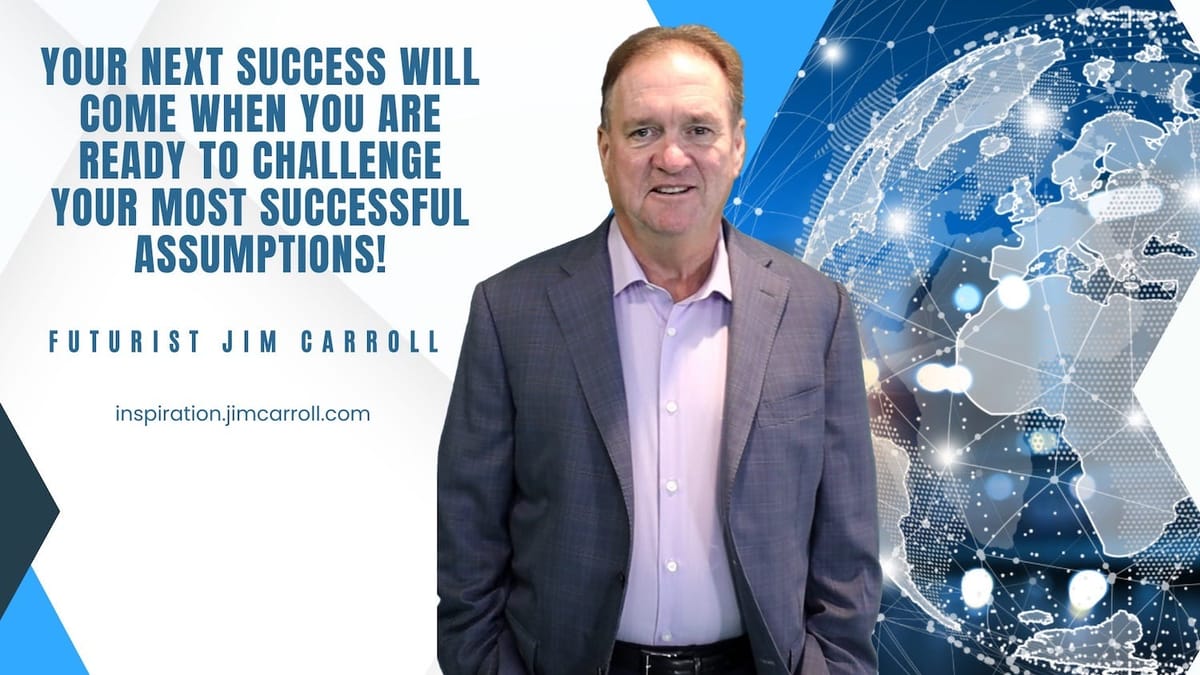Globalization as we know it is over -and with that, one of the most basic assumptions which drove the post-World War 2 economy has come to an end. That's why trend #16 of my "23 Trends for 2023" is The Great Decoupling - what happens as the assumptions behind the success of globalization are challenged, and a reorganization of the global economy occurs.

You see the impact of broken globalization all around you - stuff costs more, it's harder to get, is in shorter supply, and has long lead times. Obviously, something is broken, and something needs to be rebuilt - that's the great decoupling. Right now, companies, executives, and individuals are challenging many of the fundamental assumptions that have defined their success in the past by rethinking how to rebuild their operations in the face of new global realities.
Think about it - for a long time, the global economy was based on the assumption that we would see the continued integration of economies worldwide, accelerating deregulation, low-cost financing, geopolitical calm, logical and rational political leaders, and stable economic assumptions. But that integration, driven by easy money and cheap capital, has come to an end for a time. What drives the future now is whiplash political uncertainty driven by populist political agendas, high labor costs driven by skills shortages, supply chain challenges, relentless inflation, higher interest rates, the Russian invasion of Ukraine, and turmoil in energy markets.
The relentless volatility and uncertainty have meant that while globalization is not dying, it is certainly changing. Companies and industries have had to deal with absolutely wild challenges. In 2021, with Covid wreaking havoc on every form of freight, significant congestion in the sea freight shipping sector meant that an additional one million cargo containers traveled by rail from China to Western Europe. Companies reorganized their supply chains to take advantage of these new routes of predictable certainty - we saw a lot of similar efforts into rejigging supply chains in this way to deal with harsh new global challenges. And then, because most of these routes went through Russia, that opportunity shut down with the war in Ukraine. Once again, logistics companies and freight forwarders and logistics companies had to scramble to reinvent their supply chain path - certainty is now a luxury.
That's but one example - everywhere you look, there has been volatility, uncertainty, challenges, and barriers. The result is that many industries have gone from just-in-time supply chains to just-in-case operations! It's also why we are seeing phrases like reshoring, 'friendshoring,' deglobalization, and other similar concepts emerge with greater speed - the great decoupling! Here's a fun fact: Sentieo, a market intelligence, and research firm, found that mentions of different forms of "shoring" during company earnings calls were higher in 2022 than at any other time since 2005,
"De-shoring,' for want of a better phrase, is a significant change. Back in 2005, the hottest book in business circles was by a New York Times columnist, Thomas Friedman. The World is Flat: A Brief History of the Twenty-first Century was seen as the best summary of the wild benefits of global free trade, interlinked economies, and global supply chains humming along in perfect harmony. Perhaps we never imagined what might happen to that perfect integration if many of the core assumptions were rendered irrelevant by fast-moving events and accelerating uncertainty - such as a global pandemic.
And so today, many companies are busily figuring out how to rebuild, reinvent, and realign their global operations, and that will consume a huge amount of the time of leadership teams in 2023.
They are busy looking at how to move production out of China into other countries - and doing it quickly. Vietnam is enjoying a manufacturing renaissance, and given its proximity, Mexico is particularly hot! Warehouse rents near airports are skyrocketing as companies turn to air cargo as the only possible solution to more complex logistics issues. The investment in automation, robotics, and skills acceleration is picking up speed as companies work to bring back overseas factory jobs to new facilities closer to home - seeking to achieve previously unattainable cost savings while doing so. Companies are discovering these investments can help to close the price gap - one American machinist notes they can now manufacture a high-precision progression stamping tool for parts used printed circuit boards, for about 5-15% above the price of Chinese toolmakers. Half a decade ago the gap was about 30-50%.
The trend is also driving forward the acceleration of many other trends. We are seeing new investments in technologies and ideas that bring production closer to home - more localized supply chains, vertical farming, 3d printing, mass customization technologies, and other concepts. It's a fascinating time for this to occur, as companies learned something significant about innovation during Covid - how to do it faster! Think about quickly many companies and industries quickly pivoted to the production of masks and PPE during the early days of the pandemic. They learned something new about speed, and are never going back!
All of this means that in 2023, many will discover that their next success will only come by challenging the most basic assumption about their previous success. Globalization was a big assumption and responsible for massive success, but now, with it being under significant pressure, new pathways to success must be discovered and capitalized upon.
There's an invaluable personal lesson in this type of thinking- you can never assume that what got you here is what is going to get you there. The future will always involve wild twists and turns, unexpected surprises, and wild volatility. To keep going forward, you need to continually reinvest in the foundations - the assumptions - that have defined your success!
Because your next success will come when you are ready to challenge your most successful assumptions!
Jim Carroll never assumes that his past success will drive his future success. That core assumption forms the basis of many of his leadership keynotes, which is why they resonate with senior executives in global Fortune 1000 comapnies - his mindset matches their need for insight. Success is never guaranteed - only invented!

